These matzo ball soup dumplings taught me to stop worrying and enjoy Asian-Jewish fusion food
Jeremy Dean’s viral mashup is as genius as it is irreverent
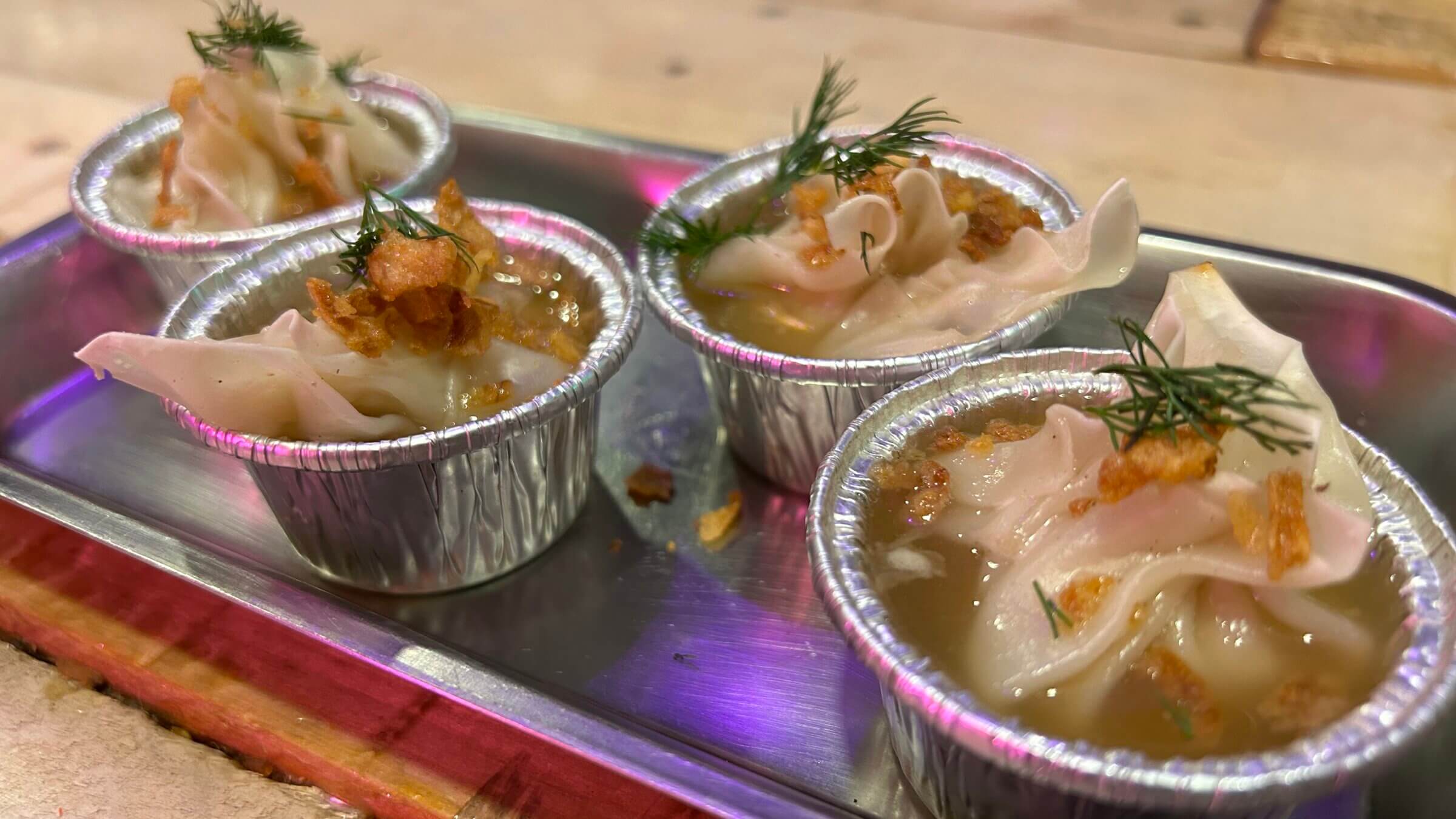
Lucky Rabbit’s matzo ball soup dumplings are boiled and served in an Asian-style chicken stock that contains ginger, vinegar, and Chinese five spice powder. Photo by Sam Lin-Sommer
As a Chinese-Jewish food writer, I can be a bit puritanical about my peoples’ foods. If you were to sit down with me for xiaolongbao, thin-skinned Shanghainese soup dumplings jiggling with molten broth, I would tell you to order the classic pork or crab versions, not the black-tinted truffle ones that have been popping up in Flushing lately.
I feel the same way about matzo ball soup. It has cured the colds of countless Ashkenazim with its simple, dilly, golden broth and fluffy, chewy matzo balls. Tampering with the recipe ought to be banned by the FDA.
Or so I thought until I took a trip to the Asian-inspired Lucky Rabbit Noodles in Dumbo, Brooklyn, to sample “matzo ball soup dumplings” that had recently made a splash on TikTok.
I sat at the counter of the 10-seat, neon-lit space, where a cook served me a tray of aluminum foil shot glasses, each one containing a dumpling floating in an opaque, golden soup and topped with dill and fried shallots. Each dumpling was filled with a chewy, dense matzo ball that was a dead-ringer for what I had grown up eating at Jewish delis, but this time flavored by a gingery, slightly sweet, umami-rich chicken stock. They tasted like a matzo ball that had been raised in East Asia, with a stint in Brooklyn, and grown up to become delicious and beautiful.
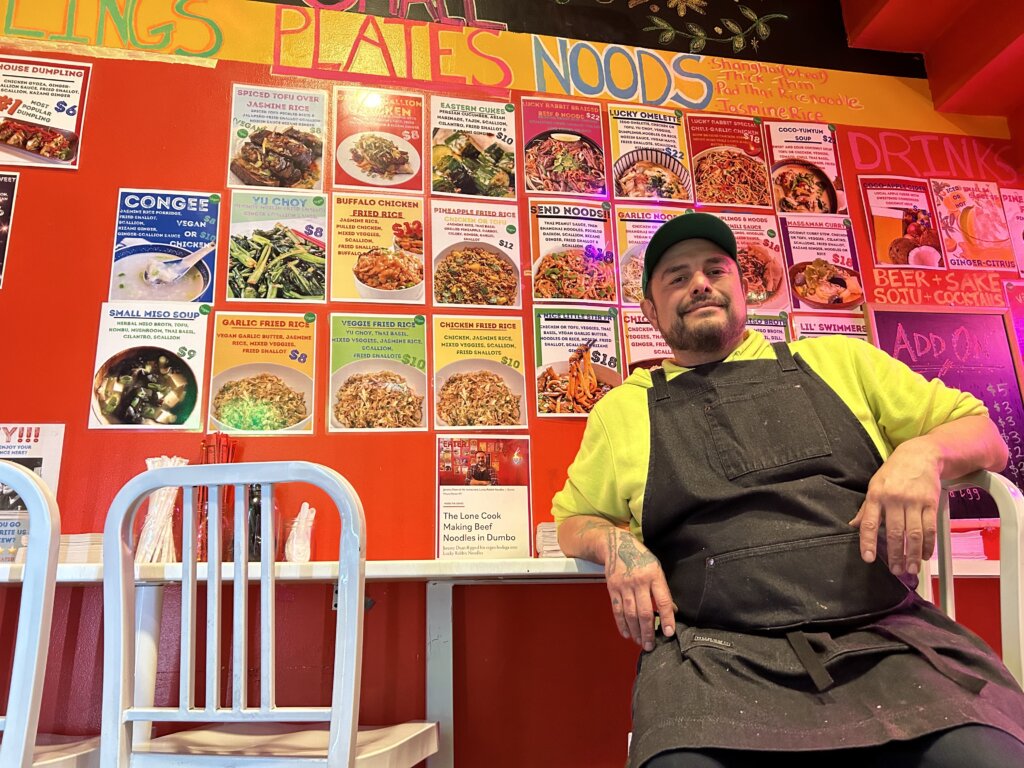
As it turns out, their inventor has neither Chinese nor Ashkenazi heritage. Chef Jeremy Dean grew up in Portland, Oregon, and is of Mexican and Salvadoran descent. “This is definitely a fusion of cultures,” Dean told me of Lucky Rabbit and its menu. Goateed and dressed in a neon yellow hoodie under denim overalls, he spoke calmly, pausing often to smile and laugh, as he explained how he ended up opening this Asian noodle shop under the Manhattan Bridge.
Dean got his start cooking at a Portland pizza joint when he was 14 years old, and attended culinary school at age 19. One of his first jobs after culinary school was working as a sushi chef at Disney World. For the rest of his 20s and 30s, he cooked at a variety of farm-to-table restaurants in Brooklyn, often taking off to travel the world during the slow months of January and February. In 2013, after a restaurant he had been working at in Dumbo closed, he decamped to Thailand.
“I went for a two week vacation, and I didn’t come home,” Dean said. Instead, he traveled Southeast Asia for six months, then settled in Bangkok, where he stayed for three years, punctuated by jaunts in places like China, Japan, Vietnam and Singapore. During his time in Bangkok, he opened a Philly cheesesteak truck at a local market.
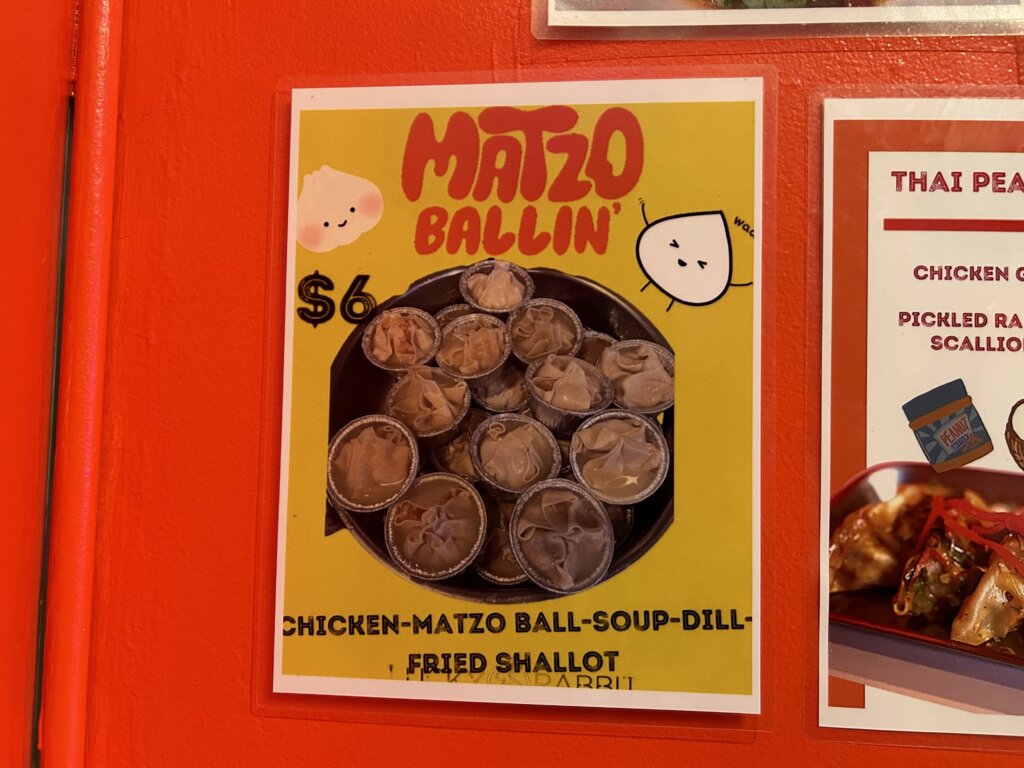
“When you become a vendor there, everyone around you is your family,” he said. “They were feeding me and teaching me. Kind of just showing me how to cook Thai food.” After decades of cooking, Dean could learn recipes just from watching people cook, so he would observe his friends at work, then replicate their methods in his Bangkok apartment.
After returning to New York in 2016, Dean embarked on a series of professional ventures that included a catering company and a vegan bodega. In early 2021, he decided to open Lucky Rabbit in a tiny space on a quiet street in Dumbo, blocks away from the East River and just under the rumbling Manhattan Bridge. “Number one, I love Asian food and I never had the opportunity to cook it professionally,” he said. “But number two, this neighborhood never had an Asian restaurant.”
The shop’s name was inspired not by a phrase in an Asian language, but rather by Dean’s pet rabbit, who died while Dean was developing his idea for the restaurant.
Lucky Rabbit’s menu dances across East and Southeast Asia, leaning heavily on Thailand. But if you’re looking for a faithful rendition of an Asian dish — say, of my beloved xiaolongbao — look elsewhere. “I don’t want to do anything authentic, because I am not of that singular culture,” Dean said. “I always put my spin on something to make that change.” He also incorporates his fair share of Latin American ingredients, like chipotle peppers and Tajín chili powder.
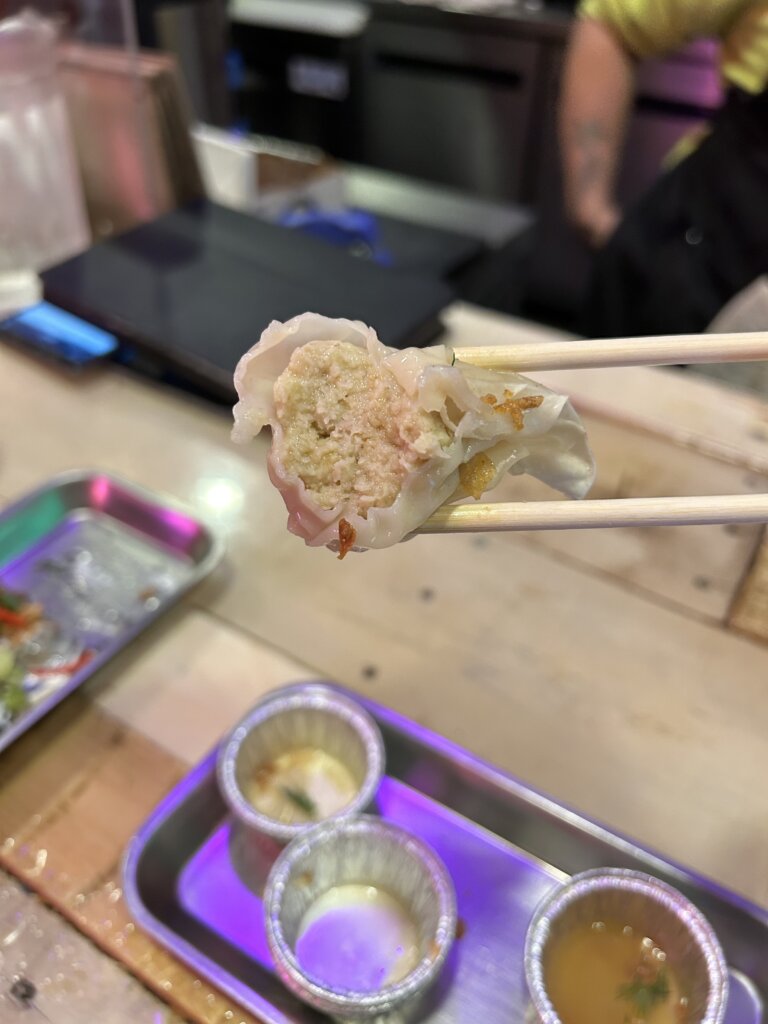
For example, Lucky Rabbit serves Coco-Yum Yum soup, a coconut version of Tom Yum; his Lucky Omelette is inspired by Hiroshima’s famous okonomiyaki griddle crepes, but he makes them on a small Japanese tamago pan; he seasons his cucumber salad, a popular dish throughout much of East and Southeast Asia, with Tajín. Dean omits shrimp, pork, and soy from his cooking, opts for halal-certified meat, and replaces soy sauce’s umami kick with a mushroom-based Chinese seasoning, all in a nod to customers’ dietary restrictions.
“When you own the restaurant, you do whatever you want,” Dean said. “But it’s got to be good.”
And it is good. Very good. I tried Lucky Rabbit’s truffle-mushroom-sweet potato dumplings, and they won me over with their smooth umami undertones, creamy filling, and punch of bright-red, pickled ginger.
Dean’s penchant for following his gut might explain how he came up with the idea of combining Chinese soup dumplings and matzo ball soup.
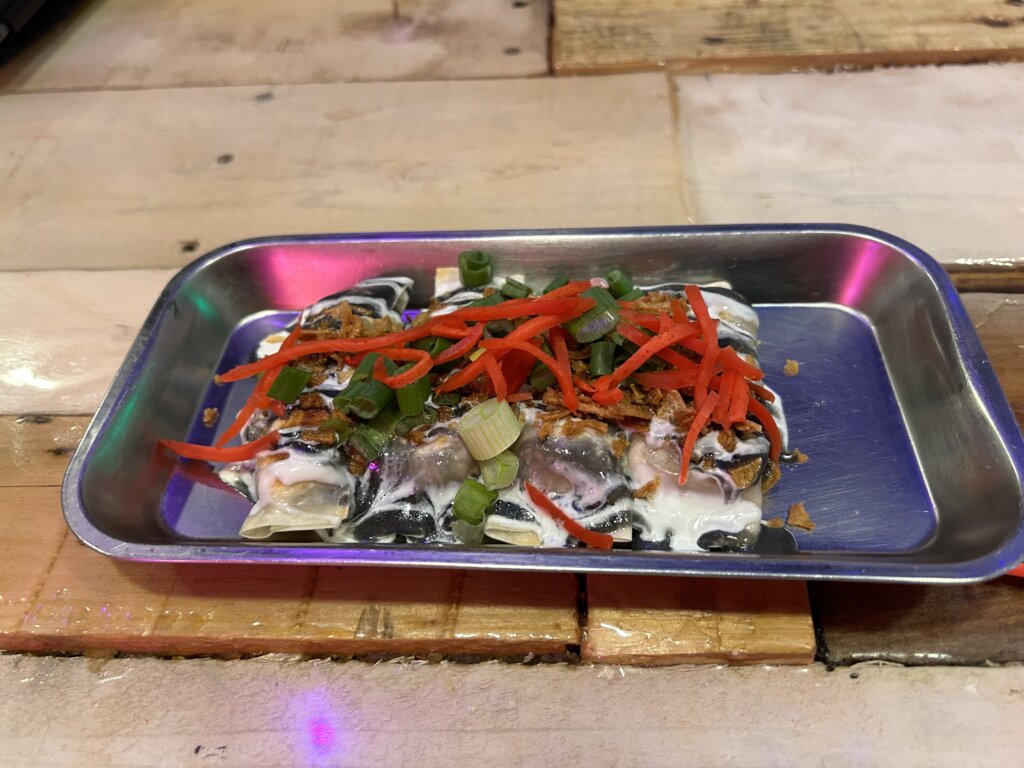
“The short version of that is I just love matzo balls. Like, I’m in New York. If I see it on the menu, I’m gonna order it,” Dean said. “So I always wanted to do that on a menu, too.” The dish reminds him of the chicken soup his Salvadoran mother makes with vegetables, potatoes, cilantro, lime, and sometimes pumpkin. “Matzo ball soup is such a close iteration of that,” he said. “It really reminds me of my mom’s food — the comfort of that, you know?”
The long version of his Frankenstein dish’s story is that immediately before Dean opened Lucky Rabbit, he was consulting for Tao Group Hospitality on the reopening of their restaurant Legasea at the Moxie Hotel in midtown Manhattan. His chef de cuisine was Israeli, and the two of them featured an upscale matzo ball soup that servers would pour for customers at their tables. “When we decided to do matzo ball soup, we called his mom for his grandma’s recipe,” Dean recalled. This Jewish family secret informed the matzo ball recipe Dean would soon remix into a Chinese-Ashkenazi viral hit.
When he opened Lucky Rabbit, he was still consulting for Tao. “I had matzo ball on the brain,” Dean said. He turned the starchy balls into a dumpling fit for his Asian noodle shop: He and his team make matzo balls from scratch, cook them, then mash them up with a handful of other ingredients, such as carrot, onion, garlic, celery, and garlic, to create a chewy filling.
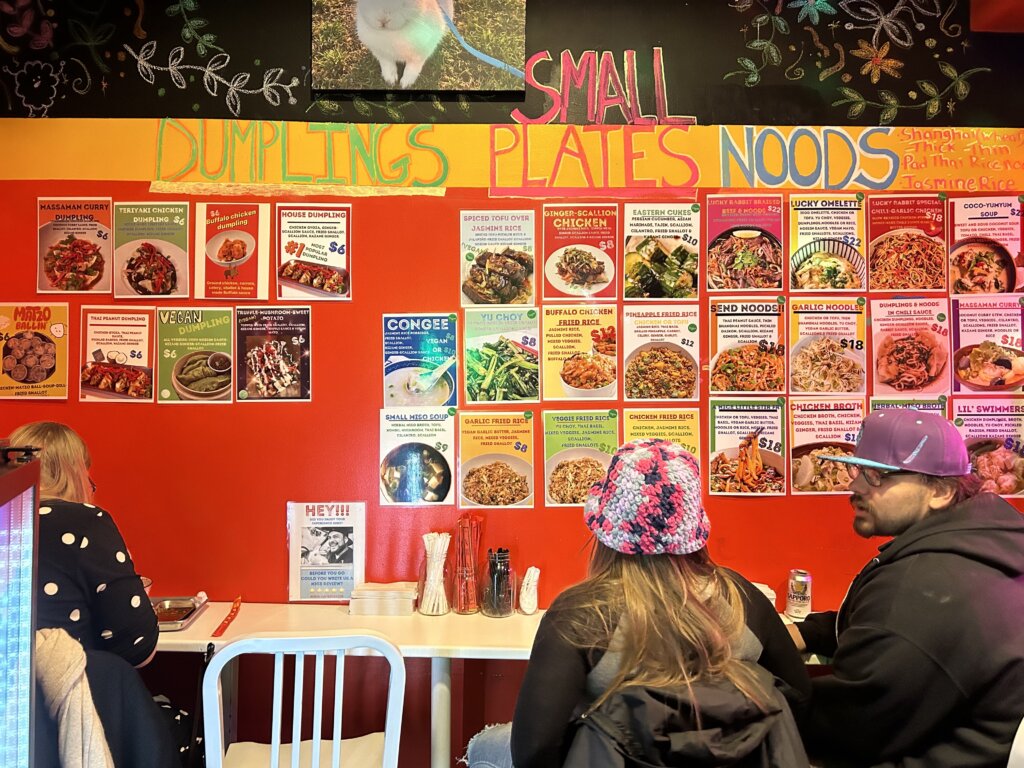
Though Chinese food mavens like myself might read the phrase “soup dumpling” and think of a soup-filled dimsum treat, Dean’s are something different entirely. The traditional method was too labor-intensive for his staff of two to three cooks to make alongside their other items, and he wanted an item that would hold up better on delivery rides than Shanghainese wheat wrappers bulging with soup. So he came up with the idea of boiling more common (albeit matzo-filled) dumplings in his house chicken stock, which is laced with ginger, vinegar, Chinese five spice, and a Chinese mushroom seasoning, then serving the dumplings in little disposable shot glasses filled with the broth. You might call it a deconstructed version of the Southeastern Chinese dish.
As they boil, the dumplings flavor the broth, and vice-versa. The mellow root vegetables in the matzo ball meld perfectly with the more intense Asian seasonings in the broth, along with the dill and fried shallots placed on top for garnish. The result is a chewy matzo ball with an echo of bold Asian seasonings, and an intense, savory broth with Ashkenazi undertones. The dish isn’t confusing. It’s well-rounded and confident, the best-case outcome of seemingly distinct cultures simmering in one pot and truly, deeply getting to know one another.
















